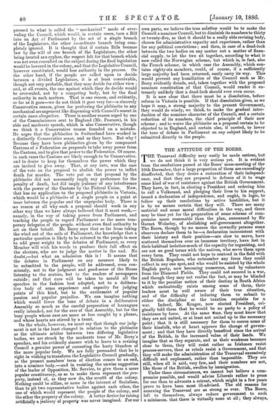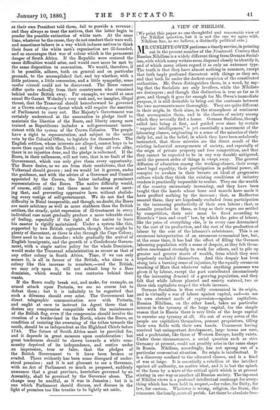THE ATTITUDE OF THE BOERS, T HE Transvaal difficulty may easily
be made sericrus, but we do not think it is very serious yet. It is evident from the resolutions passed at the Boers' mass-meeting of the 10th December, that a large proportion of them are exceedingly disaffected, that they desire a restoration of their independ- ence, and that they are prepared in defence of it to wage some kind of war of resistance against the British Government. They have, in fact, in electing a President and ordering him to call a Volksraad, and pledging their lives to his support, issued a declaration of independence, and ought, in logic, to follow up their resolutions by active hostilities, but it is by no means certain that they will. There are many material and some moral difficulties in the way, and there may be time yet for the preparation of some scheme of com- promise more reasonable than the plan, announced by Sir Garnet Wolseley, of abolishing self-government altogether. The Boers, though by no means the cowardly persons some observers declare them to be—a declaration inconsistent with their history and their position—are slow to move, have scattered themselves over an immense territory, have lost in their habitual isolation much of the capacity for organising, and are not on good terms with the natives, who serve them upon every farm. They could not hope to contend in the field with the British Regulars, who outnumber any force they could collect in any one spot, and who would be assisted by the whole English party, now becoming numerous, and by volunteers from the Diamond Fields. They could not succeed in a war, and though they may not realise the fact, or may be blinded to it by the peculiar notion of their destiny in South Africa which undoubtedly exists among some of them, their leaders must be well aware of their true situation, and of the difficulty of inducing them to submit to either the discipline or the taxation requisite for a war. Indeed, Mr. Kruger, now elected President, ori- ginally told them that he would be no party to a policy of resistance by force. At the same time, they must know that they are not united, or at least not united up to the necessary point ; that it is still necessary for them to coerce some of their kinsfolk, who at heart approve the change of govern- ment; and that they have directly benefited since the arrival of the British, in the increased value of their lands. We imagine that as they separate, and as their weakness becomes clear to them, they will resist rather as Irishmen resist process-servers, than as rebels resist a Government, and that they will make the administration of the Transvaal excessively difficult and unpleasant, rather than impossible. They are still, when all is said, very few, and their numbers are not, like those of the British, swollen by immigration. Under these circumstances, we cannot but believe a com- promise possible, and would advise Liberals rather to press for one than to advocate a retreat, which might in a few years prove to have been most ill-advised. The old reasons for annexing the Transvaal are as strong as ever. The Boers; left to themselves, always reduce government to such a minimum, that there is virtually none at all ; they always, as their own President told them, fail to provide a revenue ; and they always so treat the natives, that the latter begin to ponder the possible extinction of white men. At the same time, whatever be the cause, they do not conduct their wars well, and sometimes behave in a way which induces natives to think their fears of the white men's organisation are ill-founded, and so encourages that war of colour which is the permanent danger of South Africa. If the Republic were restored the same difficulties would arise, and would once more be met by the same disposition to annexation. We would, therefore, if it be possible, adhere, both on general and on particular grounds, to the accomplished fact, and try whether, with a little patience, a little concession, and a little sympathy, some modus riven& could not be discovered. The Boers cannot differ quite radically from their countrymen who remained behind under British sway. For example, we would at once annul Sir Garnet Wolseley's very rash and, we imagine, illegal threat, that the Transvaal should henceforward be governed as a Crown colony,—a threat which will require the sanction of Parliament to carry out. Her Majesty's Government was certainly understood at the annexation to pledge itself to maintain the liberties of the Boers, and liberty among men trained as Republicans includes a self-government incon- sistent with the system of the Crown Colonies. The people have a right to representation, and subject to the usual veto by the Colonial Office, to legislate for themselves. The English settlers, whose interests are alleged, cannot hope to be more than equal with the Dutch ; and if they all vote alike, there is no injustice done, and the pledge is redeemed. If the Boers, in their sullenness, will not vote, that is no fault of the Government, which can only give them every opportunity. The Boers desire, as we see from their resolutions, that the Volksraad should govern ; and we would let it govern, under the guidance, and with the advice of a Governor and Council appointed by the Crown, the latter including prominent representatives of the Boers. The native difficulty would, of course, still exist ; but there must be means of meet- ing that, and preventing oppressive laws, without abolish- ing every vestige of self-government. We do not find the difficulty in Natal insuperable, and though, no doubt, the Boers are more arbitrary as well as more stubborn than the British settlers, the steady, quiet repression of ill-treatment in every individual case must gradually produce a more tolerable state of feeling, especially if the right of the native to leave his master is rigidly maintained. Under a system like this, supported by two British regiments, though there might be plenty of discontent, as there is also through the Cape Colony, there need to be no disorder ; while gradually the arrival of English immigrants, and the growth of a Confederate Govern- ment, with a single native policy for the whole Dominion, would make the Transvaal administration as secure as that of any other colony in South Africa. Time, if we can only secure it, is all in favour of the British, who alone in a colony like this increase in numbers,—and the British, we may rely upon it, will not submit long to a Boer dominion, which would be two centuries behind their wants.
If the Boers really break out, and make, for example, an armed attack upon Pretoria, we see no course but to defeat them ; but it is infinitely to be regretted that such a dilemma should ever arise. The Government has direct telegraphic communication now with Pretoria, and ought at once to instruct its Agent there that it desires any compromise compatible with the maintenance of the British flag, even if the compromise should involve the creation of a border-land in the North, where the Boers, on condition of resisting the swarming of the tribes towards the south, should be as independent as the Highland Chiefs before 1745. The future of South Africa must be provided for, and it depends in great measure upon confederation ; but great tenderness should be shown towards a white com- munity deprived of its independence, and restive under an impression, true or false, that the pledges of the British Government to it have been broken or evaded. There evidently has been some disregard of under- stood promises ; and it is not pleasant to see a Governor, with no Act of Parliament so much as proposed, suddenly announce that a great province, heretofore governed by an Assembly, shall be governed by the Governor alone. The change may be needful, as it was in Jamaica ; but it is one which Parliament should discuss, and discuss in the light of promises too like treaties to be lightly set aside.



































 Previous page
Previous page